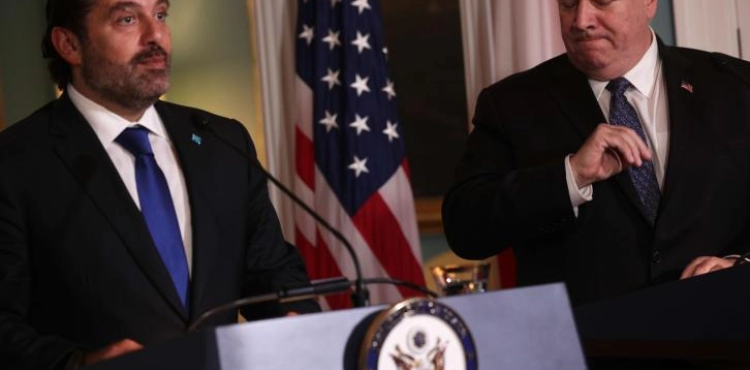Amid mounting pressure against Hezbollah and its financial activities in Lebanon and abroad, it is natural for the United States to put pressure on Lebanese Prime Minister Saad al-Hariri during a visit to Washington this week, analysts say.
"The United States has made it clear to Hariri that the Lebanese government should be strong enough to reduce Hezbollah´s influence by not implementing all the decisions taken by the party," political analyst Rajeh Khoury told Xinhua.
"The United States does not want the Lebanese government to engage in any political trends that run counter to US policies in the region," he said.
In turn, political analyst Samir Atallah expressed his belief that Washington had informed Hariri by a message that weakness in the face of Hezbollah will not be tolerated anymore.
"The United States is helping Hariri by imposing sanctions on Iran to weaken Tehran and its allies in the region, Hezbollah," he said.
"These sanctions, from America´s point of view, should make Hariri stronger because Hezbollah officials have long criticized the United States for meddling in Lebanon´s internal affairs," he said.
Earlier this week, Hariri began a visit to the United States, during which he met with US Secretary of State Mike Pompeo and a number of US officials to discuss the situation in Lebanon and bilateral relations between the two countries.
Pompeo and Hariri held a joint press conference on Thursday evening after their talks at the end of the Lebanese prime minister´s visit to Washington.
"Lebanon is threatened by Iran and its proxy Hezbollah," Pompeo told the news conference.
US officials have on many occasions expressed support for Lebanon and its legitimate institutions, while adopting a stance against Hezbollah, which Washington classifies as a "terrorist group."
The United States has also expressed grave concern after Hezbollah succeeded in taking control of three of the 30 ministries in the current Hariri government, including the Ministry of Health, which has the country´s fourth-largest budget.
In addition, Hezbollah and its allies won more than 70 of the 128 seats in the Lebanese parliament in last year´s elections, while Western-backed Hariri lost about a third of its deputies.
Since then, pressure has increased against Hezbollah. On July 9, the US Treasury Department designated three party officials, MPs Mohammed Raad and Amin Shri, and security party official Wafik Safa as "terrorists," isolating them from the international financial system. .
According to Lebanon´s former ambassador to Washington, Riad Tabbara, the maximum for the United States is to impose sanctions on people directly connected to Hezbollah.
He said the United States was unlikely to exert more pressure on the Lebanese government, which is facing Hezbollah, because it is well aware of the sensitivity of the Lebanese situation.
He explained that "the United States usually takes sanctions against people who have direct links to Hezbollah, without aiming to harm the Lebanese banking sector and the economy of the country."
For his part, Atallah said, "US pressure will not amount to harm the economic and financial sectors in the country."
"We must always remember that Lebanon hosts many Syrian refugees, and it is not in the interest of any European country or the United States to hit Lebanon financially," he said.
In this context, Hariri announced yesterday (Thursday) after meeting with the President of the World Bank that the Bank has promised continued support to Lebanon.
Analysts believe that even if Hariri is pressed by the United States, he may not be able to limit Hezbollah´s strength in the country.
Khoury said Hariri would not be able to weaken Hezbollah because the group was allied with President Michel Aoun and his brother-in-law, head of the Free Patriotic Movement and Foreign Minister Gebran Bassil.
He added that "there is a political settlement between Hariri and the" current "led to the election of Aoun as president, and returned Hariri to the premiership."
Aoun was elected president on October 31, 2016, after the vacancy of the presidency for more than two years, after the prominent Sunni leader Saad Hariri announced his support for Aoun despite the alliance with Hezbollah in return for Aoun´s promise to support him as prime minister.












